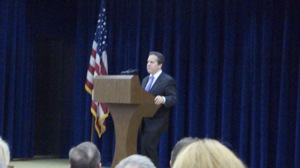Reform of our patent process could help stimulate innovation and entrepreneurial activity by offering more cost-effective means of protecting intellectual property. But despite bipartisan support, the Senate reform bill has not made it to the floor for a vote. The stakes are high; patents are often critical to securing venture capital funding and without protection of their intellectual property, entrepreneurs are often reluctant to undertake risky investment in commercializing their innovations. At our recent small business briefing in Washington DC, members of the National Small Business Association told White House officials that at least six years pass from the time of filing for patent protection to the first office action and hundreds of thousands of dollars in legal expenses are incurred in the process. The backlog of applications to the U.S. Patent and Trade Office exceeds 700,000. Other countries offer clearer, more transparent processes, such as a first to file system. The United States is the only major developed country to award patents to those who can prove that they invented something before someone else filed a patent on it. As a result, our system is mired in costly litigation to resolve needless disputes. The reform bill would transition the U.S. to a first to file system and would reduce by one-half filing fees for smaller businesses. Let’s make our voices heard by our Senators and Congressmen that patent reform is a top priority for the small business community.
Time to Fix Our Patent System
June 24th, 2010Plus Ça Change
June 24th, 2010Waste and abuse that was tolerated in the boom economy is now coming under long overdue scrutiny. The Associated Press reports that New York State is preparing to junk the Empire Zone program, which was ostensibly to help businesses create jobs and expand the tax base in under-served communities. In fact, it was nothing more than welfare for politically connected large corporations. The independent Citizens Budget Commission found that most companies failed to deliver the promised jobs in exchange for substantial tax breaks awarded by the Empire Zone program. Companies that failed to meet the targets for job creation or their own investment include major Fortune 500 companies, such as Coca-Cola and Target. But before we break out the champagne and celebrate, let’s ask two questions: first, does New York State intend to demand a refund of the tax credits improperly used by close to 5,000 companies in the Empire program? Second, does New York really believe that the Excelsior Program, which it is touting as the success to Empire, will be any less prone to corruption and abuse?
Morale in the Gulf Coast
June 23rd, 2010Residents of Louisiana must be on pins and needles as their fate is decided. A judge overturned the moratorium on offshore drilling imposed by the federal government, which government action caused additional hardship for the state, as it depends on the jobs and taxes generated by the oil industry. And the rest of the country would share the pain, as recent research by the energy analysts of Goldman Sachs found that a ban on offshore drilling would reduce expected oil production by one-half by 2015. As long as we depend on fossil fuels to meet our energy needs, a complete ban appears shortsighted. Even worse, according to the State Department, the administration declined offers put forward by 30 countries and international organizations to assist in containing and cleaning the oil spill.
The White House indicated that it plans to appeal the ruling. A news report that the judge who overturned the moratorium may have undisclosed financial ties to the oil industry likely strengthens the government’s position. And just when you think that the news cannot be worse for the Gulf Coast, the National Oceanic and Atmospheric Administration reports a 30% likelihood that a tropical wave coming from Haiti may develop into a serious cyclone. A hurricane would only worsen the environmental crisis, as high winds and storm swells could spread the contaminants.
But for the fishing and tourism industries, the storm has already hit. CNN reports that P&J Oyster Company, a business in the heart of New Orleans’ French Quarter that has been operating for 134 years, was forced to close. A study published by Texas A&M University Press reports that the four largest industries in the Gulf of Mexico, accounting for $230 billion in economic activity annually, are oil, tourism, fishing and shipping. It may be years, according to the report, if not decades, before these industries fully recover. No wonder USA Today reports of the importance of keeping up morale in the region; recovery will be a long and tough process.
Words of Inspiration
June 22nd, 2010Jeff Bezos, the CEO of Amazon, delivered the commencement address at Princeton University and his words should resonate with every entrepreneur, as they inspire the graduates:
“After much consideration, I took the less safe path to follow my passion, and I’m proud of that choice.
Tomorrow, in a very real sense, your life — the life you author from scratch on your own — begins.
How will you use your gifts? What choices will you make?
Will inertia be your guide, or will you follow your passions?
Will you follow dogma, or will you be original?
Will you choose a life of ease, or a life of service and adventure?
Will you wilt under criticism, or will you follow your convictions?
Will you bluff it out when you’re wrong, or will you apologize?
Will you guard your heart against rejection, or will you act when you fall in love?
Will you play it safe, or will you be a little bit swashbuckling?
When it’s tough, will you give up, or will you be relentless?
Will you be a cynic, or will you be a builder?
Will you be clever at the expense of others, or will you be kind?
I will hazard a prediction. When you are 80 years old, and in a quiet moment of reflection narrating for only yourself the most personal version of your life story, the telling that will be most compact and meaningful will be the series of choices you have made. In the end, we are our choices. Build yourself a great story. Thank you and good luck!”
A Tin Ear in Washington
June 21st, 2010
Kenneth Feinberg, the man appointed by President Obama to administer a $20 billion fund to compensate Gulf Coast oil spill victims, promised to speed claims payments even as a federal judge considers a lawsuit to lift the moratorium on offshore drilling. The U.S. Department of the Interior stopped the approval of any new permits for deepwater drilling and suspended drilling at more than 30 existing exploratory wells in the Gulf of Mexico. But Hornbeck Offshore Services of Louisiana filed a lawsuit in which it claimed that the government acted arbitrarily without any proof that the operations posed a safety risk. Hornbeck claims that the moratorium causes additional hardship to Louisiana, which stands to lose thousands of jobs in the oil and gas industry, even as its fishing and tourism industries are already devastated by the oil spill. Today, Judge Martin Feldman heard arguments in the case in New Orleans federal court. He will issue his ruling by Wednesday. Louisiana Governor Bobby Jindal filed a brief with the court supporting the plaintiffs’ lawsuit. What is most outrageous about the federal government is that it did not consult Louisiana officials before imposing the moratorium, in violation of federal law. U.S. District Judge Nancy Atlas in Houston listened to the New Orleans court hearing today by telephone. She is hearing a similar case against the federal government filed by a Texas-based operator of drilling rigs. Let’s hope that the judges send the federal government a clear message about abuse of power and overreach.
A Disastrous Weekend
June 20th, 2010The weekend began with a series of giant tornadoes tearing through Minnesota, destroying buildings and causing at least three deaths. The National Weather Service received 36 reports of tornado sightings which, if all are confirmed, would exceed the previous record of 27 tornadoes striking Minnesota in a single day, back in 1992.
Estimates of the volume of oil leaking each day into the Gulf of Mexico were revised upward as more information about the extent of the rig damage came to light. More Gulf Coast tourism and fishing businesses closed as a consequence of the environmental damage. USA Today published an excellent article about the disaster fatigue suffered by Gulf Coast residents who are “forever in recovery” as Katrina-inflicted damage is still with them even as they face the consequences of the oil spill.
The southern states experienced an extreme heat wave, with temperatures in the high 90s/100s. And summer doesn’t officially begin until tomorrow! We are in for a tough weather season. To get you thinking about updating your disaster recovery plan, check out the following article by Inc. magazine columnist Donna Fenn.
The Value of Mutuality
June 17th, 2010Mutual insurance companies are owned by their policyholders and, as such, are limited in their ability to raise capital. Unlike stock companies, mutual insurers cannot raise equity by selling additional shares. This constraint prompted the demutualization trend in the U.S. and in the U.K. in the 1990’s as mutual insurance companies, such as the Metropolitan Life Insurance Company, launched initial public offerings of stock. Demutualization was believed to raise capital for expansion, increase efficiency and motivate management by offering stock-based incentives for performance. But what of the policyholders? I have observed that small business commercial policyholders of mutual insurance companies are generally more satisfied with their coverage than policyholders of stock companies. In particular, the process of adjusting and paying claims appears to be more transparent and fair to the mutual policyholders. Now, the Association of Cooperative Mutual European Insurers has published a study “Valuing Our Mutuality” that examines the performance of mutual insurers. The researchers looked at premium income and growth, claims payments, expenses and financial performance. The study substantiates what I had observed anecdotally: mutual insurers generally have higher claims ratios than publicly traded insurers, such that more money goes back to the policyholders per paid premium. What was even more striking was the finding that mutuals are more efficient in their expense management: the five-year average expense ratio for life mutual insurers was 13.2% vs. 14.8% for their publicly traded peers. (The expense ratio represents the insurance companies’ expenses divided by its net premiums earned. A lower ratio represents better cost control measures.) The researchers limited their review to European life-health and property-casualty insurance companies; it would be interesting to learn if we have a similar result in the U.S. insurance industry. In Prepare for the Worst, Plan for the Best: Disaster Preparedness and Recovery for Small Businesses (Wiley, second edition paperback, 2010) I urged small business owners to carefully consider the claims paying record of an insurance company when choosing coverage. Make sure to obtain quotes from mutual insurers as part of your selection process. The research shows you may be happier with the results.
State Contracting Becomes Riskier
June 16th, 2010The states face budget shortfalls in excess of $100 billion and are coming up with creative ways to conceal their problems, including stiffing vendors. The Wall Street Journal reports that New York State has been unable to pay approximately 30,000 agencies with which it contracts for social services. State agencies are quietly asking the contractors to continue to provide services without any assurances that the government will pay them or when any payment could be expected. Typically, New York uses emergency appropriations, called extender bills, when it cannot reach a budget agreement between the Governor and the State Legislature. This may be the first time that funding for such social services has not been included in the extender bill. The Governor warns that chaos may result if a budget is not passed this week. But it is not just social service agencies that are suffering; construction companies report that New York State is also in arrears in paying them, as well, and they have been quietly asked to continue to work without pay. Given that nearly all of the states are facing varying degrees of fiscal strain, New York’s experience is not likely to be unique. Small businesses that have the state government as a client face an awful choice: do you continue to provide services, if you have a sufficient reserve of working capital to do so, in the hope your loyalty will be rewarded later? Or do you cut your losses and deem the government an undesirable client?
Breakfast with Congress
June 15th, 2010
One of the highlights of the National Small Business Association presentation in Washington DC was the Congressional Breakfast, held this year in the Senate Caucus Room where Senators and Congressmen addressed key small business issues and answered questions from NSBA members. Senator Landrieu (D-LA) secured the facilities for the Congressional breakfast, but unfortunately was unable to attend, owing to last-minute emergencies related to the oil spill. Her staff represented her at the breakfast. Rep. Niki Tsongas (D-MA) spoke on the Small Business Innovation and Research program. Rep. Peter Welch (D-Vt.) spoke on small business credit card issues. Sen. Scott Brown (R-MA) and Rep. Nita Lowey (D-NY) spoke separately on the small business legislation initiatives currently moving through the Senate. Sen. Kit Bond (R-MO) urged the NSBA delegates to engage with their representatives in Congress to raise awareness of small business issues. Rep. Edward Markey (D-MA) closed the breakfast with remarks in support of small business credit card reform and preservation of the SBIR program. We should all reach out to our representatives in Congress to make our voices heard. The viability of the small business sector is critical to our economic recovery, so we have visibility now.
Let’s Fix the CARD Act
June 14th, 2010In May of last year, President Obama signed into law the CARD Act, which restricts some of the more abusive practices of credit card accounts, such as retroactive rate increases on outstanding balances. Unfortunately, despite the heroic efforts of Senators Landrieu and Snowe, the protections are limited to individual consumers and do not extend to small businesses. The bank lobby argued against extending protections to small businesses, claiming that such action may limit the availability of capital for revolving loans on credit card accounts and may result in higher interest rate charges. Of course, small businesses are already experiencing lack of access to credit and high charges, so if you accept the banks’ argument at face value, there was nothing to lose by extending the CARD Act to include small businesses.
As a concession of sorts, the Senate, in quashing the attempt to include small businesses in the CARD legislation, directed the Federal Reserve Bank to conduct a study of credit card use by small businesses. The Fed has just released the study, smallbusinesscredit click to download it. The Fed’s report does confirm the positions taken by small business advocacy groups as to the extensive use of credit cards by small business owners for working capital needs. It also highlights the benefits of improved disclosure requirements. However, it stops short of offering specific recommendations to protect small business credit card accounts from deceptive practices by the issuing banks. The good news is that the Small Business Credit Card Act of 2009 (H.R. 3457) is working its way through Congress. Add your voice to the fifteen national business and consumer organizations that have endorsed this legislation. Write to your senator and congressman and urge his support of this legislation at a critical time when small businesses need transparent terms on their credit card accounts.






